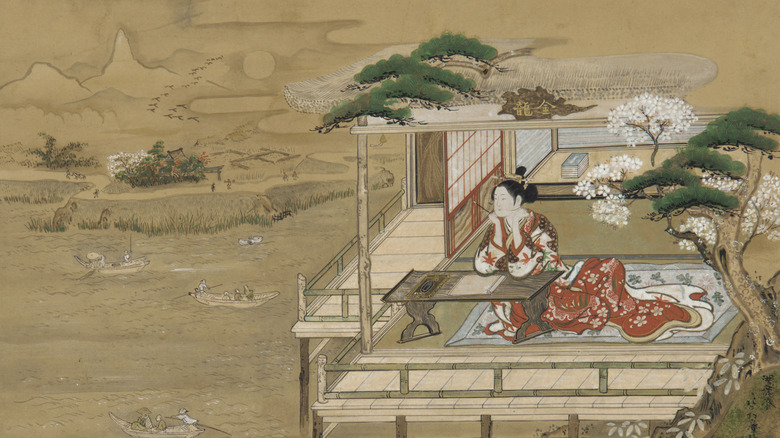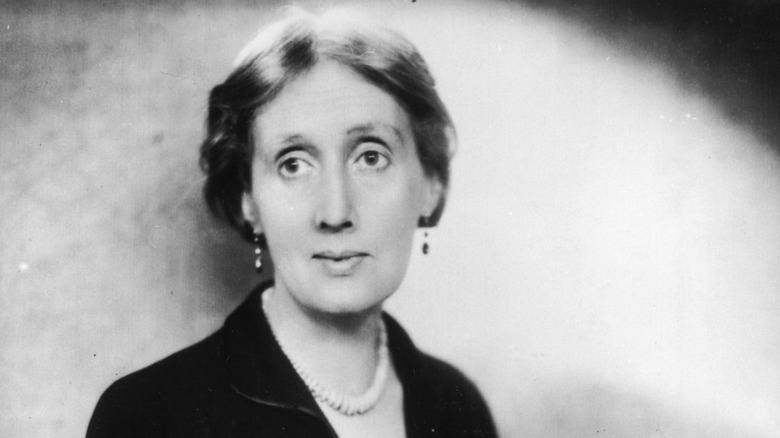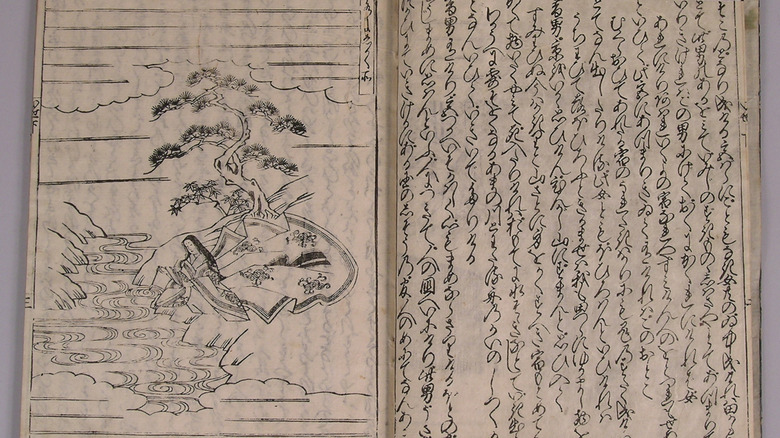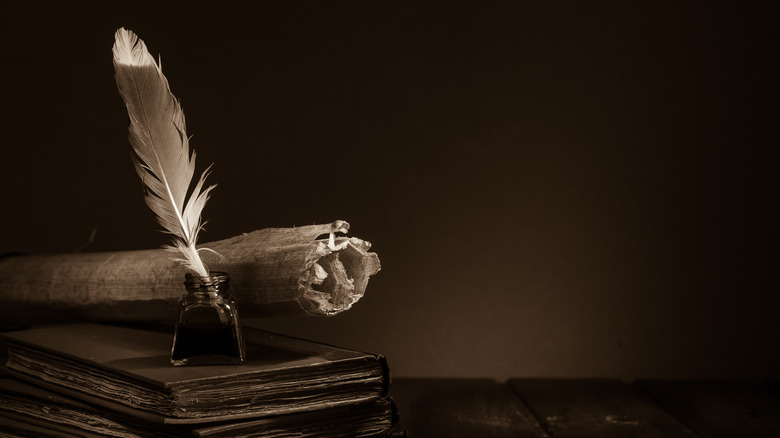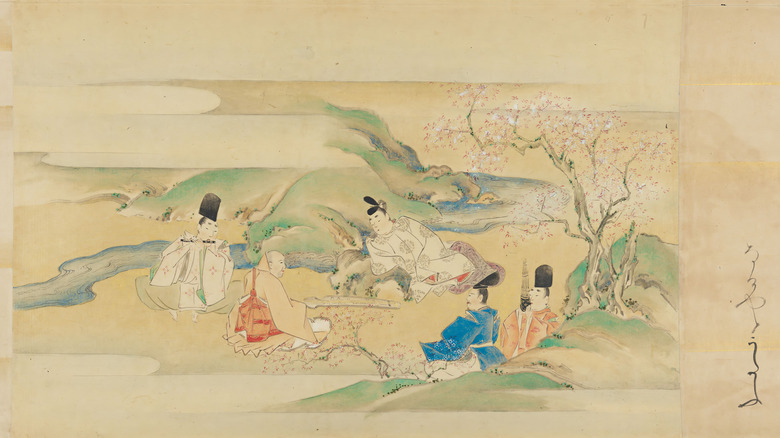The Untold Truth Of The World's First Novel
There is some debate over which book holds the distinction of being the world's first novel. Examples of narrative texts that meet various criteria associated with the novel can be found as far back as the 1st century A.D. According to Book Riot, the Greek story "Callirho," written by Chariton of Aphrodesius, possesses several motifs characteristic to the novel: royalty, romance, conflict, violence, and a little bit of "baby daddy drama." The book is so old that it was written on papyrus, but is it the world's first novel?
Harvard professor Melissa McCormick doesn't think so. She told the BBC that the world's first novel is an 11th-century Japanese narrative titled "The Tale of Genji" by Murasaki Shikibu. The novel follows the son of an emperor who is removed from his position in the court and made to live as a commoner. After an account of his sundry amorous exploits, it details his return to the royal court before finishing up with a complex plot involving several of his descendants. "The Tale of Genji" is a truly singular and progressive work that enjoyed widespread success in Japan at the time of its publication, and the history behind its creation is fascinating in its own right. Although the notion has its detractors, it is now widely considered to be the world's first novel. Let's take a look into how it earned the distinction and see how it measures up to earlier works that some claim outdate it as the first.
The world's first novel was written by a woman
The success of "The Tale of Genji" is remarkable on several levels. For one thing, Murasaki Shikibu was a woman, one writing in an extremely patriarchal society. But that wasn't the only barrier that her novel was good enough to break through. As Professor McCormick told the BBC, not only was she looked down upon for being a woman, but also for the art through which she had chosen to express herself. Fiction was not a respected genre in 11th century Japan. "Murasaki Shikibu was writing in a mode of literature that was, at her time, fairly denigrated," she said. "Fiction was at the lower rung of the scales of the genre hierarchies." But despite these powerful barriers, Shikibu's book was such a masterpiece that readers couldn't help but deem it high art.
In reality, Shikibu faced another hurdle to the success of "The Tale of Genji." As CNN notes, she wrote the book in the kana script, which was a writing system largely developed by and for women. (Kana translates to "woman's hand," while the accepted script by the literate ruling classes at the time, kanji, means "man's hand.") Kana allowed women to express their individuality, intellect, and sexual liberty, while men looked down on it and were even discouraged not to write with it. These prevailing attitudes couldn't stop "The Tale of Genji" from being a roaring success in Japan, but it would take some time for the novel to become an international classic.
Virginia Woolf popularized The Tale of Genji in the west
The New Yorker notes that "The Tale of Genji" went on to inspire Japanese art and literature for centuries after its publication. Allusions to the novel can even be found in the popular Japanese graphic novel genre known as manga. The rest of the world, however, took nearly a thousand years to catch on. The first English edition, translated by Arthur Waley, wasn't printed until 1925, but it made up for lost time by getting a review from some literary star power. It was reviewed by English novelist Virginia Woolf, and the groundbreaking author showered "The Tale of Genji" with praise, albeit praise tinged with the attendant racial stereotypes of the day. She exoticized the work, but was hardly the only westerner guilty of such a sin at the time.
Woolf's main error in her review of Shikibu's masterpiece was the fact that she didn't read the whole thing before writing about it. Waley published his translation in six volumes, but Woolf had only read the first one when she wrote her review for British Vogue. Although she raved about "Genji" and considered it a towering accomplishment that significantly outshone what English writers were doing in the 11th century, she claimed that it did not have the "force" of the work Russian novelist Leo Tolstoy, for example. Modern readers' qualms with Woolf's treatment of "Genji" aside, her review was popular enough to give the novel the boost it needed to join the canon of classic international literature.
The Tale of Genji's similarities to the modern form of the novel
Shikibu's sprawling narrative checks off just about every item on the list of properties that modern writers, readers, and critics associate with the novel. As The New Yorker notes, it possesses (or, one could argue, pioneered) the qualities of a Bildungsroman, a novel that follows a character through his formative years and spiritual development. The story of Genji's coming of age also includes critiques of society and culture similar to the canonical English works of authors like George Eliot (pen name for Mary Ann Evans), Henry James, Jane Austen, and others. These features made "Genji" extremely popular among readers in 11th century Japan and, eventually, the rest of the world.
"For the first time, you had characters that really jumped off the page," Professor McCormick told the BBC, "and one of the ways that happened was through a kind of writing in which you have a sense that you're in the character's thoughts." She added that the book possesses qualities like interiority, irony, distancing, and other elements typically ascribed to the novel. The use of an underappreciated form of vernacular to tell the story of Genji's development also situates the book in the novelistic tradition. Basically, while many English readers have pointed to 18th-century books like Daniel Defoe's "Robinson Crusoe" (1719) and Johnathan Swift's "Gulliver's Travels" (1726) as contenders for the world's first novel, it had actually already been written centuries before.
Some historians argue other novels came before 'The Tale of Genji'
Despite the endorsement from experts like McCormick and the lengthy list of traits that qualify "The Tale of Genji" as the world's first novel, some date the birth of the novel long before the 11th century. Writing for Book Riot, librarian Anna Gooding-Call lists four other narratives that predate "Genji" that she believes to be contenders for the progenitor of the popular art form. She tenders the aforementioned 1st century Greek story "Callirhoe" as a possible world's first. The second option she mentions is "The Golden Ass," a 2nd century Roman book she claims is as ridiculous as its name suggests. It follows a young man named Lucius who wants to use magic to transmogrify himself into a bird, but as you might guess from the title, he accidentally turns himself into a donkey. The narrative deals with him trying to figure out how to get back to his human form. You know, common people problems.
Gooding-Call's third possibility for the world's first novel is "Dashakumaracharita," a romance written in prose by an Indian writer named Dandin in the 7th or 8th century A.D. Although it's missing its beginning and end, the entertaining work involves tales of royalty doing whatever monarchs do in fiction, ergo, according to Gooding-Call, it's a novel. Still, most experts disagree, and "The Tale of Genji" is widely considered to be the world's first novel.
A long-lost chapter was found in the 21st century
The thing about books is that they get beat up. Think about the last time you lent one to a friend or coworker and the condition it was in when (and if) it was finally returned. Now think about the life of a book that's a thousand years old. Despite its popularity, parts of "Genji" were lost for centuries, only to be discovered quite recently. In 2019 CNN reported that a long-lost chapter to the world's first novel had been found among the belongings of a Japanese family with a lineage that can be traced back to the country's feudal era. The copy with the extra chapter was found by 72-year-old Motofuyu Okochi and authenticated by a Japanese cultural preservation organization. The manuscript is believed to be a transcription of "Genji" written by the poet Fujiwara no Teika (1162-1241). Okochi's ancestors received the book as a gift in 1743.
Experts were able to authenticate the chapter by means of analyzing the handwriting, which they deemed matched that of the other chapters. They also found that the color of the binding is the same as other authenticated texts from the era, and a small piece of paper that identifies the book also matches similar slips of paper from original texts. Even now, an entire millennium after its publication, the world's first novel appears to contain surprises for readers the world over.

